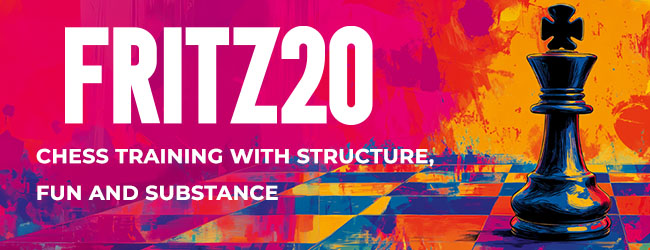Sports
The "Chess Passport" is here
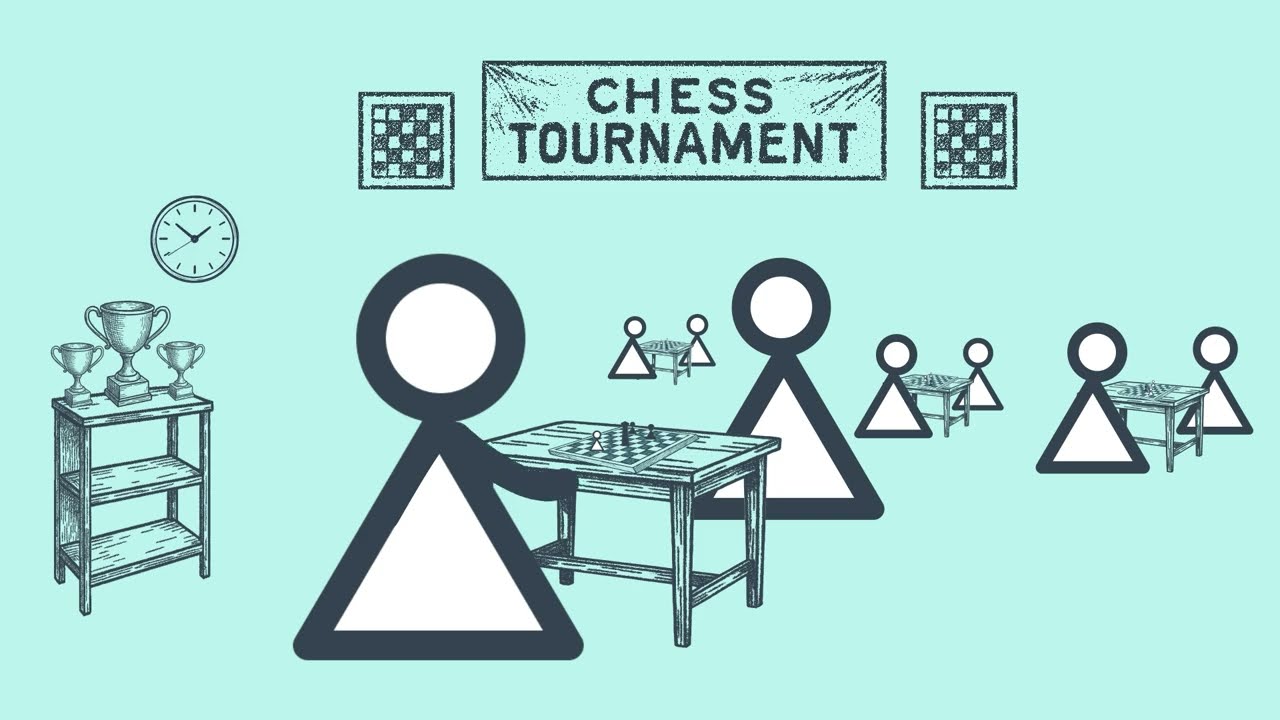

by ChessBase

5/29/2025 – World Chess and the Algorand Foundation propose levelling the playing field with a “chess passport”. In a whitepaper published last month, World Chess (LSE: CHSS) and the Algorand Foundation (ALGO) conceptualize a new blockchain-based system that would establish secure, private, and verifiable credentials for global sports organizations, including chess.
Winning starts with what you know
The new version 18 offers completely new possibilities for chess training and analysis: playing style analysis, search for strategic themes, access to 6 billion Lichess games, player preparation by matching Lichess games, download Chess.com games with built-in API, built-in cloud engine and much more.

In a whitepaper published las month, World Chess (LSE: CHSS) and the Algorand Foundation (ALGO) conceptualize a new blockchain-based system that would establish secure, private, and verifiable credentials for global sports organizations, including chess. Grandmaster Evgenij Miroshnichenko contributed to the paper alongside the Algorand Foundation and World Chess.
The move comes as interest in chess hits a new high, driven by popular television series on Netflix and the BBC, the 2024 awarding of the youngest-ever world chess champion, and the inclusion of chess for the first time in the Esports World Cup later this year.
If adopted, the system would allow chess players to independently manage their identity and credentials across all chess platforms and organizations with a single decentralized ID, and one login credential for everywhere they play. They could then easily “port” their identity, achievements, records of play, rankings, and rewards across online chess platforms, as well as seamlessly from the digital world to in-person games and tournaments. This provides them with a much easier way to prove their identity, no matter their status or documentation; it would also reduce tournament application times significantly. Chess organizations would then be able to welcome even more players to their competitions, including those who have built their chess career solely online, as well as players who have previously only competed in tournaments held by other organizations.
Among other benefits, the adoption of a “global chess passport” would make it much easier for organizers and chess clubs and federations alike to onboard and register players, both online and offline.
Another benefit of the proposed system is to safeguard fair play. As chess becomes increasingly integrated into e-sports and online competitions, the use of AI programs or player fraud (one player representing another) is an increasing concern. Being able to confirm player integrity (including whether they have been banned for cheating on any other platform) ensures credibility of chess contests and competitions. These verifiable credentials also preserve player privacy. They can be used to confirm player eligibility and relevant identity data without providing access to sensitive documentation, such as passports. Finally, identity verification also prevents fraud in tournament payouts. Phishing and other attempts to steal winnings are on the rise; this ensures only the rightful winner can access their prize funds.
“I think that chess needs its version of the global e-version of drivers license. It’s a global game, and using blockchain for the benefit of having one universal independently verifiable ID is something that both players and organizers will certainly benefit from,” says Ilya Merenzon, CEO of World Chess.
“This initiative is not just about chess; it’s about the future of fair play and verifiable achievement across all sports and esports,” said Bruno Martins, principal architect at the Algorand Foundation and co-author of the whitepaper. “Chess has a rich history of proving the usefulness of new technologies. In this case, World Chess is showing the integrity, privacy, and portability of records in any competitive arena is not only possible – it’s in the best interest of every player, everywhere.”
Statista estimates that the market for esports should reach $4.8 billion in 2025, with nearly 900 million players by 2029 (source), all of which could benefit from better cross-platform registration for online and in-person competitions.
The full whitepaper and more information about the proposed open-source system can be found here. Chess platforms, esports organizations and other parties interested in contributing to the project can get involved by contacting engineering@algorand.foundation.
About World Chess
World Chess (LSE: CHSS) is a leading chess gaming and entertainment company and FIDE the official commercial partner. World Chess reinvents the sport for the modern consumer by developing chessarena.com, the exclusive platform to play for the FIDE-recognized rating online, running Armageddon, the chess league for prime-time television, and a new kind of chess clubs. The company organized the World Chess Championship Matches in New York and London and signed some of the biggest chess media deals in history. The company’s shares are traded on London Stock Exchange: LSE:CHSS. More at worldchess.com.
About Algorand Foundation
This video course provides a comprehensive and practical White repertoire in the Ruy Lopez! Through instructive model games and in-depth theoretical explanations, you will learn how to confidently handle both main lines and sidelines.
Free video sample: Introduction
Free video sample: Overview
Free video sample: Chigorin: 9…Na5 10.Bc2 c5 11.d4 Nd7/cxd4
Algorand’s mission is to power a world where information has integrity and innovative ideas can scale. The Algorand Foundation supports Algorand’s rapidly growing ecosystem by providing a best-in-class developer environment, supporting key infrastructure and setting technical standards, offering comprehensive support to builders and entrepreneurs, and providing the framework for decentralized governance. Launched in 2019, the Algorand (ALGO) blockchain has grown into a vibrant ecosystem of developers, entrepreneurs, and enterprise partners that benefit from institutional-grade certainty and resilience. Its low fees, instant finality, and minimal carbon footprint appeal to the protocol’s millions of retail users, and developers of all kinds appreciate the ability to use common programming languages like Python and Typescript. Builders on Algorand are creating protocols and companies that solve important problems at a global scale: instant payments in war and disaster zones, self-sovereign identity for the disenfranchised, supply-chain traceability for global commerce, permissionless protocols addressing financial inclusion, and the creation of entirely new markets through tokenization, to name a few. To learn more and start your journey on Algorand, visit algorand.co.
CONTACT:
- press@algorand.foundation
- media@worldchess.com
In this video course, experts including Dorian Rogozenco, Mihail Marin, Karsten Müller and Oliver Reeh, examine the games of Boris Spassky. Let them show you which openings Spassky chose to play, where his strength in middlegames were and much more.
Pop-up for detailed settings
We use cookies and comparable technologies to provide certain functions, to improve the user experience and to offer interest-oriented content. Depending on their intended use, cookies may be used in addition to technically required cookies, analysis cookies and marketing cookies. You can decide which cookies to use by selecting the appropriate options below. Please note that your selection may affect the functionality of the service. Further information can be found in our privacy policy.

Sports
Nebraska Volleyball’s Dominating 2025 Season Like This Isn’t Normal

On this week’s Saturday Morning Coffee Show, Jack Mitchell and Josh Peterson welcomed the two hosts of Volleyball State, Jeff Sheldon and Lincoln Arneal, onto the podcast to dive into the 2025 Nebraska volleyball season. Has this level of dominance been a surprise? Are there weaknesses other teams could exploit?
They discussed those topics and more. Below is a lightly edited transcript of select conversations from the episode.
“Enjoy this dominance”
Josh: I don’t think that any of us are surprised that we are now chatting on December the 13th and the program sits one win away from another Final Four. But just kind of going big picture first, are you shocked at all by the domination that this program and this particular team has been able to show now for three-plus months running? Where they’re barely dropping any sets. Has it shocked you at all?

Jeff: What we’ve seen pop up in the last couple of weeks is the saying “this match could have been an email.” It’s sort of become a running joke with Nebraska volleyball. I mean, just in my opinion, yeah, I think it is surprising because you don’t really see this level of dominance in 2025 when the talent is a little bit more spread out than it was maybe 15, 20 years ago. And the athleticism is just so good in the women’s college volleyball game.
For one team to kind of do this is really, really impressive. And kind of the thing that I know sounds crazy when talking about it, and I talk about it on the show with Lincoln, too, there are still kind of areas of Nebraska’s game where you think they can get better. You’re like, “Eh, you know, this part wasn’t super strong,” or “Man, I think, you know, they could go to another level if this player did a little bit better.” And then you turn around, you look at the score and they hold Kansas to the lowest score that’s ever been totaled in a Sweet 16 match, and you sound insane. Because it was like 12, 11, 12 last night and Kansas didn’t really look ready for prime time, but Nebraska kind of makes a lot of teams look that way.
Lincoln: [sarcastically] Nebraska’s outside hitters; none of them hit above .300 last night. So they really need to shape up and really step up their game a little bit, too.
But to go to your question, Josh, I’m not that surprised. I was really high on this Nebraska team as well too. It’s the level of dominance that’s maybe a little surprising, but for Nebraska to be in this position, I fully expected it to, and it’s fun to watch.

So I think that’s one thing that Jeff and I have also talked about all season, is enjoy this dominance because it’s not very often that a team of this caliber comes along. Nebraska started the year strong with very big wins against Pittsburgh and Stanford, but I think that Penn State match you saw on that first Friday of October when a similar score to completely beat down a hobbled defending national title champion. But you saw what Nebraska can do when they’re locked in and really focused on doing what they do well. And we’ve seen that several times this year, including a little bit of it last night against Kansas. So, it’s impressive what they can do.
Nebraska volleyball is a story of what you hope for from higher education
Jack: I’ve got a question that I don’t want it to go into a place where you know that’s uncomfortable, so I’ll try and ask it in the best possible way. I think we know based on the personalities, the social media, and everything on this team, there are some players on this team that wouldn’t otherwise probably be close for a lot of reasons. And there have been discussions about that.
Rebekah Allick been outspoken about what she believes. Harper Murray, to some degree, has. And then you got [geography]; all kinds of different things, which you have on any college team. But I think there have been people trying to even say this year; people have been at our mentions Josh. Like, “hey why aren’t you talking about the rift?” Right? “Why aren’t you?” And I’m sure you guys have had way more of that than we have. The thought is still there when people think and talk about this team.

And again, I don’t want to go into that necessarily, but I haven’t ever seen anything that looks like [that]. In fact, I’ve seen like just the opposite, which I think is always a fascinating thing about college sports generally. There isn’t really a lab like that in many other places where you combine different geographic backgrounds, different races, different politics, different upbringings together, and then they’ve got a function like that. I mean, it really doesn’t happen many other places.
Lincoln: Where else are you going to get an Italian who’s with a girl from rural Colorado?
Jack: Different countries even, yeah.
Lincoln: And I think Jack, to go to this point, go watch Harper Murray’s TikToks that she put out this week, where she gifted her teammates all this free swag from Adidas. Harper is genuinely nervous before giving all of her teammates this free stuff because it means so much to her that she really does appreciate her work. And then just the pure joy that these young women are showing each other for Adidas shoes and luggage.
The connection that this team has, again, it goes back to my kind of premise of Dani [Busboom Kelly] building this foundation of joy and trust and happiness, that really kind of infiltrated every aspect of this program.
Jeff: You know, to me, this is one the best parts about college, whether it’s college sports or not. The importance of higher education is you get to bring these people from different places and different backgrounds and put them together, whether it’s on a volleyball team or a basketball court or just a classroom, to be exposed to different ideas and different kinds of people. How boring would our lives be if everyone we knew thought the same way and believed the same things and have the same experiences? There’s enough of that in the state of Nebraska right now.

And so I think it’s a wonderful thing that you have someone from place A and place B who have a different set of beliefs, maybe. And maybe they could talk about him and understand each other and realize that they’re still all on the same team and love each other. Work for the common goal. That’s kind of the whole point of higher education and I wish more people valued that.
Are they real concerns for why Nebraska can’t win a national title?
Josh: How many things can you actually name that you believe in in terms of why they won’t win a national championship?
Jeff: I mean, everyone’s gotta be healthy, right? And this is cold and flu season. And I sometimes worry that a really good serving team can make it hard for Nebraska to get in system to set their middles. Nebraska did a great job of serving Kansas [Friday] night, but you know, they’re not going to be the team that strings up the most aces. So if you run into a team like Kentucky or Texas with excellent pin hitters or Wisconsin, and Nebraska allows the other team to be in system, you know, that could be a problem.
And I just think Nebraska’s pin hitters have to be more terminal and, and it sounds insane, right? For a team that hit .450, but then you look, all of that came from the middles who didn’t have any errors and put up these crazy numbers. Harper Murray’s killing a third of her balls. Taylor Landfair killed about a third of her balls. And you’d like to get that closer to 50% like Wisconsin.

But, you know, I have to keep telling myself that’s not who Nebraska is. Like Wisconsin’s pin hitters carry them. Texas’s pin hitters carry them. Kentucky certainly does. Nebraska just does it a different way. They don’t have the country’s most terminal outside hitters. But they do have the best middle blocker duo in the country. And Bergen Riley does such a great job running that offense, and Nebraska plays such great defense, you can kind of get by with it.
Lincoln and I used to say on the show, until this year, when Nebraska set a school record for hitting percentage, that Nebraska is the Iowa football of volleyball. They will beat you with defense and special teams and third block and defense. And they don’t always have a great offense. And this year they do.
So those are just a couple of things and you’re just looking for things that can go wrong at this point. And I think Jalen Reyes has said this too; his job is to find areas where they can get better and Landfair and Murray started [against Kansas] with one kill in their first ten attempts combined and you’re like, “man, Kansas could find their way out of first here; that could be trouble!” And then they just never did.
Is it good Nebraska avoids Louisville?
Josh: Do you think DBK is happy, sneakily or maybe outspokenly, that they’re not having to play Louisville? Just to not have to deal with that discussion? They’re gonna take care of business, I imagine [against Texas A&M], but that that is a story that they don’t have to worry about going into this one.
Jeff: This was something I talked about on the show when the tournament came out; so a couple of weeks ago. I personally am glad that they’re not going to have to play Louisville because there’s just so much stuff that’s wrapped up in that. Although Dani would obviously have a pretty good scout on Louisville. I don’t know that it would have affected [the players] very much.
But [John] Cook has talked about before, when they played Wisconsin in the 2000 National Championship match, a team that he had like recruited all of those players; he wasn’t even able to enjoy it. He didn’t enjoy winning a national title and going undefeated because it came at the expense of players that he loved. And I’m sure it would have been an element of that for Dani Busboon Kelly as well.

Jeff: Yeah, I think Louisville may have been impacted more because they’re seeing their former coach there, but Nebraska would have been all right.
Watch the entire podcast below!
Want more from Jeff and Lincoln? Become a subscriber to the Volleyball State tier today for just $5 a month and get episodes before they’re released publicly, bonus podcasts, and the Volleyball State newsletter! Subscribe today at patreon.com/i80club.

More From Nebraska On SI
Stay up to date on all things Huskers by bookmarking Nebraska Cornhuskers On SI, subscribing to HuskerMax on YouTube, and visiting HuskerMax.com daily.
Sports
Ex-SJSU coach defends Brooke Slusser against Blaire Fleming’s claims
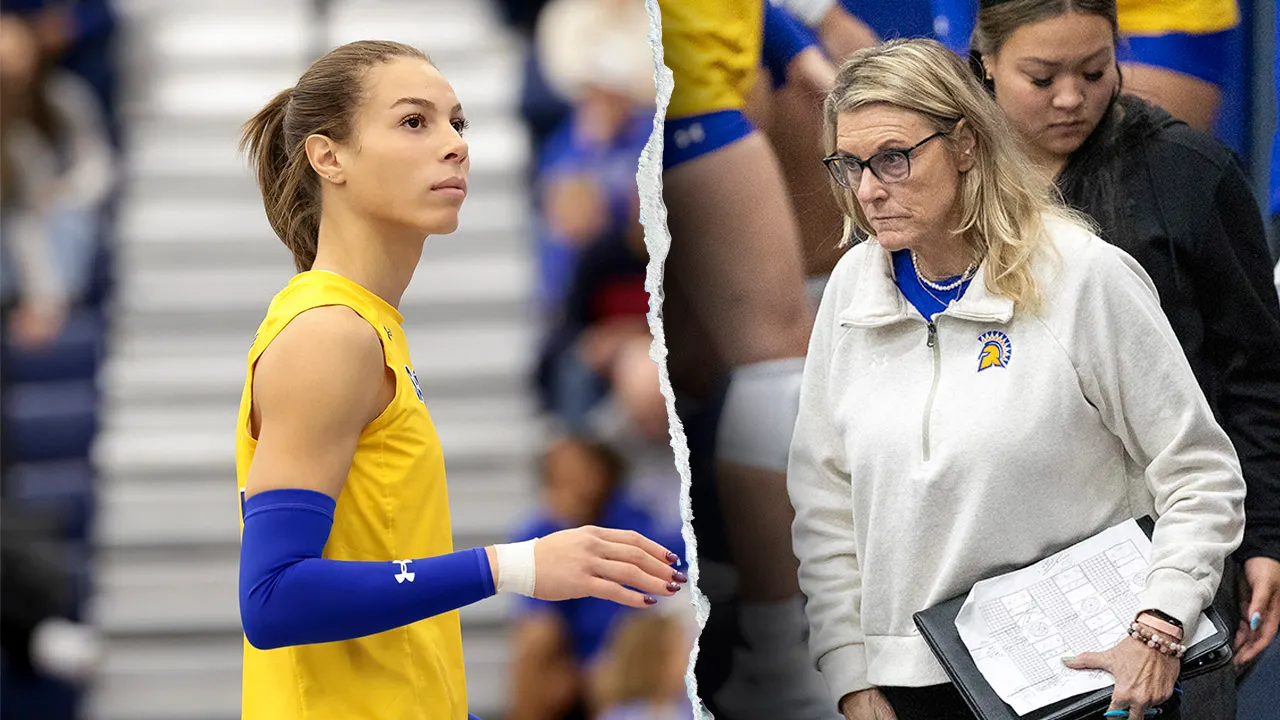
NEWYou can now listen to Fox News articles!
EXCLUSIVE: Former San Jose State assistant volleyball coach Melissa Batie-Smoose has stepped into the recent war of words between former players Brooke Slusser and Blaire Fleming.
Fleming, who is transgender, made disputed claims that Slusser has been anorexic since they first met in 2023 and failed out of her classes at SJSU. Slusser denied Fleming’s statements, previously saying that she developed an eating disorder from the stress and anxiety of playing and rooming with Fleming after discovering Fleming was a biological male, and the highly publicized scandal that ensued.
The conflict between the two players and subsequent lawsuits by Slusser against the NCAA and Mountain West conference over the situation put the players and entire program under immense national scrutiny in their final season together in 2024.
CLICK HERE FOR MORE SPORTS COVERAGE ON FOXNEWS.COM
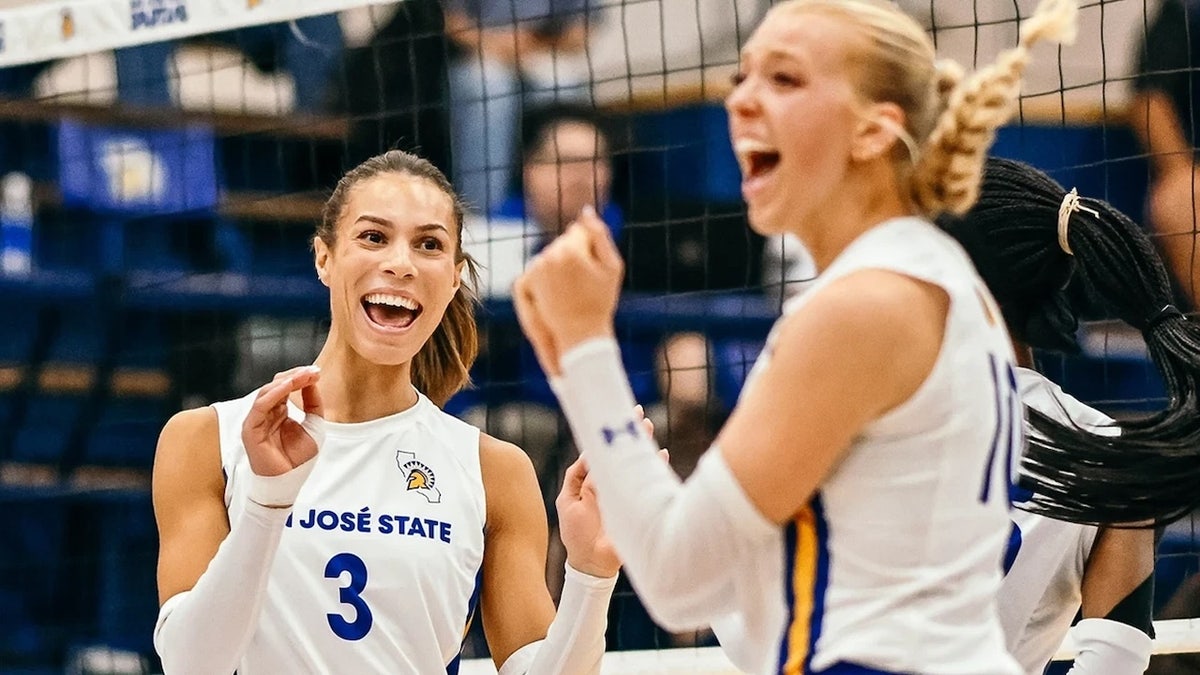
SJSU trans player Blaire Fleming and teammate Brooke Slusser went to a magic show and had Thanksgiving together in Las Vegas despite an ongoing lawsuit. (Thien-An Truong/San Jose State Athletics)
Now, Batie-Smoose has provided her perspective on the disputed claims between the two athletes.
“To my knowledge, Brooke’s mental health and academic performance were excellent during her first year and a half as a student athlete in the program. She was engaged, consistent and doing well both personally and academically. But after sharing her experience, the surrounding pressures intensified,” Batie-Smoose told Fox News Digital.
“She was chastised on campus and on social media, which seemed to cause her well-being and academic performance to decline. From my perspective, that context matters and underscores how much she has been carrying in a short amount of time.”
Batie-Smoose also expressed “disappointment” about Fleming’s disputed comments about Slusser.
“I’m a little surprised and disappointed by Blaire Fleming’s comments. Even if you’re frustrated or hurt by Brooke’s actions, I hoped there might be a little more empathy—especially from someone who has been the subject of personal attacks and understands how tough these things can get. Personal hardship should give us a deeper understanding of and more empathy for what others may be experiencing, not less,” Batie-Smoose added.
“Struggles with food, mental health or academic pressure are serious matters that deserve compassion, not dismissal. Regardless of personal dynamics, speaking harshly about someone who is clearly going through a difficult period is not something we want to encourage or normalize. Brooke’s issues with food and her grades aren’t excuses, but rather signs of someone who’s been going through a lot.”
Fox News Digital was unable to reach Fleming for comment, as Fleming’s Instagram account has been deactivated in recent days.
LAW FIRM THAT WORKED TO KEEP SJSU TRANS PLAYER ELIGIBLE ALSO CLEARED ATHLETE OF CONSPIRING TO HARM TEAMMATE
Slusser originally told Fox News Digital on Nov. 30 – the one-year anniversary of her final game with Fleming – about the impact the situation had on her body and academics.
“From the stress and how anxious I was every single day, I just wasn’t eating really at all,” Slusser said. “I went from around 160 to 128 [pounds] in that one semester. It definitely isn’t healthy for someone of my size to be that weight, and I ended up losing my menstrual cycle for nine months. So it was definitely severe.”
The 5-foot-11 Slusser added that people at home started to take notice.
“When I came home, some of my friends and family were very worried about me,” she added. “Some of my friends were just like, ‘You always looked tired all the time. You always look dead…’ I was able to come home three days that fall semester my senior year, and I had a friend later on tell me that when I saw her, she went home and cried to her mom, because she was so worried about me, just because she could tell I looked so unhealthily skinny.”
Her father, Paul Slusser, then insisted that she move back home to Texas from San Jose after the 2024 season and fall semester ended. The family said she then attempted to finish her final semester and degree online, but later dropped the classes to focus on physical and mental rehabilitation. Slusser and her family say she has recovered from her anorexia, and is working on finishing her degree. She aspires to start her own business in dietetics.
The family is still navigating the completion of her degree.
Fleming responded to Slusser’s situation, making the disputed claims to Fox News Digital on Dec. 7.
“She’s been anorexic and struggled with food since I’ve known her[,] aka since 2023. She literally would weigh herself 2-3x a day and keep track of it on her whiteboard in her room…. So I really don’t care or feel bad for her. And she didn’t drop her classes[,] she failed out[,] hope that helps!” Fleming said.
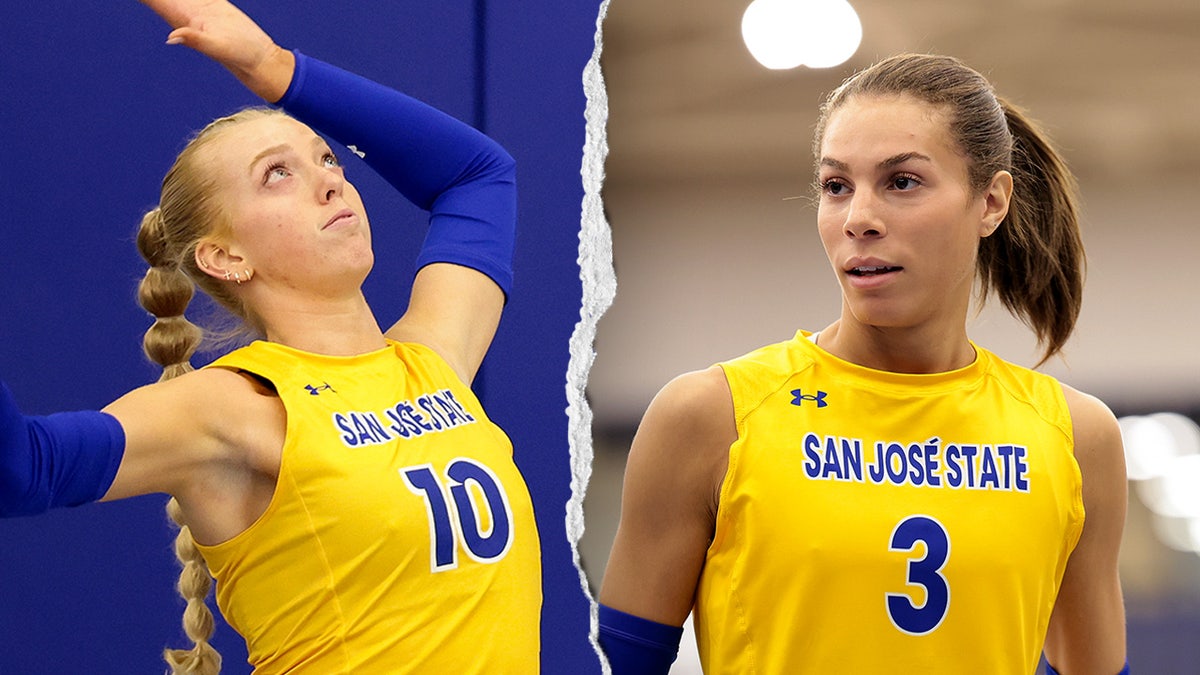
Brooke Slusser, left, and Blaire Fleming (Andrew Wevers/Getty Images)
Slusser promptly responded, calling Fleming’s statement “just not true.”
“These statements are just not true. I have always lived a very healthy lifestyle. Before these events took place[,] I was very disciplined in fueling myself for athletics and [kept] track to make sure I was where I need to be[,] to be the best athlete. It wasn’t until all the craziness started that my healthy lifestyle turned very unhealthy into not eating the amount I should,” Slusser said.
“As for school[,] I decided to stay home after fall 2024 to better myself and heal. So no[,] I did not return to San Jose and enroll myself in more courses at an institution that didn’t have my best interest.”
Slusser has alleged in her lawsuits against the NCAA and Mountain West Conference that she was never told Fleming’s birth sex, and that the two regularly shared hotel rooms on away trips. Slusser has also said in the lawsuits that Fleming confessed to being transgender during a conversation over ice cream in April 2024.
Slusser then joined Riley Gaines’ lawsuit against the NCAA in September 2024. What followed was a series of forfeits by opposing teams. Each forfeit compounded growing attention in an election-season media cycle, putting SJSU’s volleyball players and their opponents under a massive political spotlight.
President Donald Trump even mentioned the scandal on his campaign trail in October of that year, during a Fox News Channel all-woman town hall event.
Police protection was assigned to the team on a regular basis.
Slusser has alleged in her lawsuit against the Mountain West, which was filed in November, that she was allegedly informed by teammates of an alleged conversation Fleming had with an opposing player, discussing a plan to have Slusser spiked in the face during a match.
Batie-Smoose reported those same allegations in a Title IX complaint against the school, and was later suspended and did not have her contract renewed in January. Batie-Smoose has since filed her own lawsuit against SJSU over her termination.
The Mountain West commissioned a third-party investigation into the allegations against Fleming, and determined that sufficient evidence could not be found to assign discipline.
Fox News Digital has reported extensively on the conditions of that investigation and its handling, prompting critical responses by the White House, U.S. Department of Justice and members of Congress.
EX-SJSU STAR BROOKE SLUSSER MAKES NEW ALLEGATIONS ABOUT PROBE INTO TRANS TEAMMATE’S ALLEGED PLOT TO HARM HER
In the waning weeks of the 2024 regular season, Slusser and 10 other plaintiffs in her lawsuit against the Mountain West filed a request for preliminary injunction to have Fleming be ruled ineligible to continue playing, and to have the forfeits to SJSU reversed. Federal Judge Kato Crews, appointed by former President Joe Biden, denied the request, keeping Slusser and Fleming on the court together for practice and games.
Slusser and Fleming were ultimately named to the Mountain West all-conference team, as SJSU’s only honorees.
They finished the season with a 14-7 record, aided by six conference forfeits, then advanced to the Mountain West championship game after Boise State forfeited in the divisional round.
But they lost in the title game to Colorado State, three sets to one. The loss ensured that the Spartans wouldn’t take their scandal into the NCAA tournament.
Slusser left campus shortly after that at the insistence of her parents. According to The New York Times, Fleming also resumed classes remotely the following semester from Virginia.
CLICK HERE TO DOWNLOAD THE FOX NEWS APP
Slusser said she came close to returning to play NCAA beach volleyball this past spring, and even had discussions with coaches at other schools about recruitment. But she ultimately decided not to, and moved to North Carolina, where she has served as a youth volleyball coach.
The U.S. Department of Education is currently investigating the university for potential Title IX violations related to its handling of Fleming.
Follow Fox News Digital’s sports coverage on X, and subscribe to the Fox News Sports Huddle newsletter.
Sports
Can ‘completely different’ Wisconsin upset Texas in NCAA tournament?
Dec. 13, 2025, 6:51 p.m. CT
AUSTIN, Texas – Wisconsin volleyball’s first weekend of the 2025 season featured a high-profile match against Texas.
Wisconsin’s either final or penultimate weekend of the season – depending on whether UW can advance – also features a high-profile match against Texas.
But both sides will caution against reading too much into Wisconsin’s Aug. 31 loss to Texas ahead of a rematch in the NCAA tournament regional finals as each team seeks a return to the Final Four.
Sports
Nunez, Schneider and Woelfel Win Events as St. Cloud State Track & Field Closes 2025 at The Opener in Duluth

Sophomore Lauren Woelfel (Becker, Minn.) won the pole vault after clearing 3.60m/11-9.75, which was new personal best height by 0.09m, freshman Brianna Schneider won the shot put after recording a huge personal best of 12.18m/39-11.50 and sophomore distance runner Abbygail Nunez (South St. Paul, Minn.) won the 800 meters (2:32.88). Nunez also ran a new personal best in the mile (5:33.08) to finish second.
The Huskies advanced four athletes to the 60 meters final – junior jumper/sprinter Myesha Thompson (Mount Horeb, Wis.), sophomore jumper/sprinter Zaria Stapleton (Nassau, Bahamas), graduate jumper Elena Martinez-Rodriguez (Madrid, Spain) and freshman Efe Ottah – while three recorded new personal bests – Thompson (7.91), freshman Aliyah Horton (8.47) and senior sprinter/jumper Ava Wilmanns (Cedarburg, Wis.) (8.57). In the finals, Thompson finished third, Stapleton tied her personal best from last week (8.00) to finish fifth and Martinez-Rodriguez tied her season best from the prelims (8.14) to finish sixth.
Thompson also finished second in the long jump, Stapleton was fourth after leaping a career best 5.16m/16-11.25, Horton was seventh after jumping a career best 4.93m/16-2.25 and Wilmanns jumped a season’s best 4.84m/15-10.50.
Martinez-Rodriguez tied her high jump personal best that she set last weekend (1.55m/5-1) to finish second. Horton (28.93) and junior hurdler/pole vaulter/jumper Olivia Witt (Delano, Minn.) (31.24) each set personal bests in the 200 meters. Witt also set a personal best in the 60 hurdles, after running 10.82. Freshman Addison Lauwagie cleared a personal best height in the pole fault (3.20m/10-6) to finish second.
Sophomore thrower Kim Feller (East Helena, Mont.) recorded a new personal best in the weight throw (14.15m/46-5.25). In the mile, freshman distance runner Jocie Wheeler (Annandale, Minn.) set a new personal best (5:53.85) and sophomore distance runner MerriAnna Johnson (Osceola, Wis.) set a new season best time (6:03.10).
The quartet of junior sprinter Jenna Marxhausen (Two Harbors, Minn.), Ottah, freshman Abby Kennedy and Lauwagie set a new season best time in the 4×400 relay (4:14.14).
St. Cloud State at The Opener (St. Scholastica)
Dec. 13, 2025 | Burns Wellness Commons | Duluth, Minn.
60 meters (prelims)
3. Myesha Thompson – 7.91Q PR
5. Zaria Stapleton – 8.08q
7. Elena Martinez-Rodriguez – 8.14q
8. Efe Ottah – 8.20q
13. Abby Kennedy – 8.32
18. Aliyah Horton – 8.47 = PR
19. Ava Wilmanns – 8.57 PR
60 meters (final)
3. Myesha Thompson – 7.94
5. Zaria Stapleton – 8.00 = PR
6. Elena Martinez-Rodriguez – 8.14 = SB
8. Efe Ottah – 8.31
200 meters
14. Aliyah Horton – 28.93 PR
17. Olivia Witt – 31.24 PR
400 meters
3. Jenna Marxhausen – 1:03.48
5. Abby Kennedy – 1:04.33
800 meters
1. Abbygail Nunez – 2:32.88
3. Jocie Wheeler – 2:47.32
Mile
2. Abbygail Nunez – 5:33.08 PR
10. Jocie Wheeler – 5:53.85 PR
13. MerriAnna Johnson – 6:03.10 SB
60 hurdles (prelims)
6. Olivia Witt – 10.82 PR
4×400 relay
3. Jenna Marxhausen/Efe Ottah/Abby Kennedy/Addison Lauwagie – 4:14.14 SB
High jump
2. Elena Martinez-Rodriguez – 1.55m/5-1 = PR
Pole vault
1. Lauren Woelfel – 3.60m/11-9.75 PR
2. Addison Lauwagie – 3.20m/10-6 PR
6. Olivia Witt – 2.45m/8-0.50
Long jump
2. Myesha Thompson – 5.40m/17-8.75
4. Zaria Stapleton – 5.16m/16-11.25 PR
7. Aliyah Horton – 4.93m/16-2.25 PR
8. Ava Wilmanns – 4.84m/15-10.5 SB
Shot put
1. Brianna Schneider – 12.18m/39-11.50 PR
11. Mackenzie McMahon – 10.47m/34-4.25
19. Shanya Collier-Phillips – 8.57m/28-1.50
Weight throw
8. Kim Feller – 14.15m/46-5.25 PR
11. Shanya Collier-Phillips – 13.14m/43-1.50
13. Mackenzie McMahon – 12.97m/42-6.75
17. Brianna Schneider – 11.84m/38-10.25
Team Scores:
No team scores
Results (Hero’s Timing)
Results (PDF)
UP NEXT
The Huskies are done competing until 2026. SCSU will begin the second semester with the Tommie Indoor Invitational on Friday, Jan. 16 hosted by St. Thomas at the Anderson Athletic and Recreation Complex (AARC) in St. Paul. Field events are scheduled to start at 1 p.m. with field events to follow at 4 p.m. Links to coverage options will be available on the SCSU Track & Field schedule page and the meet day central.
For all the latest on St. Cloud State Track & Field, stay tuned to SCSUHuskies.com and follow the team on Twitter, Facebook and Instagram.
Sports
AU Indoor Track & Field Wraps Up 2025 With PBC Record at ’Twas the Meet Before Christmas

AUGUSTA, Ga. – Augusta University track and field continued its inaugural indoor season on Friday night at the ‘Twas the Meet Before Christmas, hosted at JDL Fast Track, with strong performances across middle-distance and distance events against a strong field.
Jaynes Breaks PBC Indoor 3K Record
Senior Avery Jaynes delivered another record-setting performance, finishing eighth in the men’s 3,000 meters in 8:11.74 to break the Peach Belt Conference indoor record in the event. The time also met the NCAA Division II provisional standard, marking Jaynes’ second conference record of the indoor season.
Junior Nasrudin Mohamed added a solid showing in the 3,000 meters, placing 10th overall with a time of 8:23.50.
Eye, Shepherd Earn Podium Finishes in 800 Meters
Augusta placed two athletes on the podium in the men’s 800 meters, led by sophomore Seth Eye, who finished second in 1:52.37. Junior Noah Shepherd followed closely behind with a third-place finish in 1:55.36.
Thomas Leads Women in 3,000 Meters
On the women’s side, junior Madison Thomas paced Augusta with a sixth-place finish in the 3,000 meters, running 10:20.93.
Sports
The Rise of Master Eli: Inspiring Young Champions at Pinoy Taekwondo Center
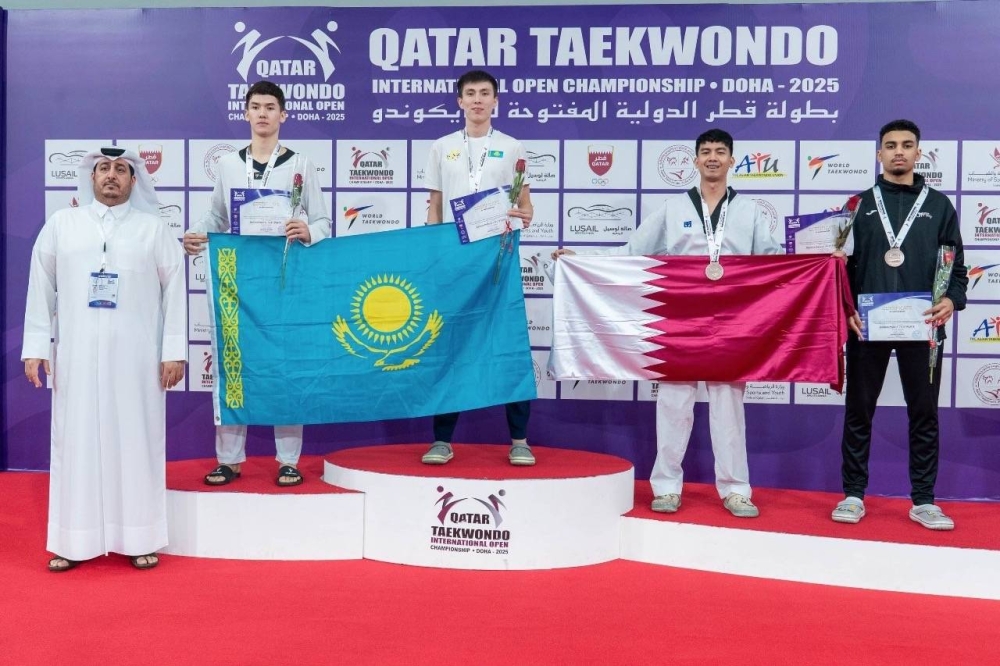
When Elijah Claravall from Isabela first stepped onto a Taekwondo mat as a young boy, he could not have imagined the journey that lay ahead. What began as a childhood hobby soon became a lifelong passion—one that would take him across borders, transform him into a mentor, and inspire the next generation of athletes in Qatar.
Today, known affectionately as Master Eli, he is both a decorated competitor and a cherished instructor within the country’s vibrant Taekwondo community. His recent Bronze Medal win at the 5th Taekwondo International Competition in Qatar is more than just a personal triumph; it is a testament to the perseverance, dedication, and passion that have defined his remarkable journey..
A Beginning Rooted in a
Mother’s Guidance
For Master Eli, Taekwondo wasn’t just an activity — it was woven into his upbringing. His mother, a Karate Black Belter and national athlete, introduced him to martial arts early, laying the foundation of discipline and resilience that would shape the course of his life.
“With my mom guiding me, Taekwondo felt natural,” he recalls. “All my sisters trained too, but only my youngest sister and I continued. She’s now a varsity athlete at UP Diliman.”
He earned his 2nd Dan black belt only after college as his mother had always reminded him that the belt was secondary. She instilled in him that his focus should not be on the belt but more on developing his skills and harnessing character with self-discipline and respect — values that would later become cornerstones of his own teaching philosophy.
Though he briefly explored basketball because of his height, the pull of Taekwondo proved stronger.
“I set Taekwondo aside to try basketball, but after four years, I realized that it was in the sport of Taekwondo where I truly belonged.”
The Leap of Faith That Led to Qatar
A defining moment arrived when he learned of an opportunity to teach Taekwondo in Qatar. It was a decision that required courage — a leap into the unknown — but it also presented the chance to share his craft with a new generation.
When he joined the Pinoy Taekwondo Center (PTC) in Qatar, he discovered more than a workplace.
He found a purpose and a home.
Over the years, Master Eli became a pillar of the center. Children gravitated toward his warmth and patience; parents admired his consistency and values; fellow instructors respected his humility and quiet confidence. In Qatar, he did not just train athletes—he nurtured character, resilience, and self-belief.
This was where he truly became Master Eli.
More Than Just a Medal
At the recent 5th Qatar International Taekwondo Competition, Master Eli fought with focus and heart — qualities he emphasizes daily in his classes. Winning bronze was a powerful moment, not merely for him but for the entire PTC
community.
“When I stepped onto the podium, I wasn’t just thinking about my performance,” he says. “I was thinking about my students. I wanted them to see that hard work matters. That effort counts.”
For his young athletes, watching their mentor earn an international medal turned inspiration into reality. It showed them that dreams are not abstract ideas—they are reachable goals shaped by discipline and determination.
Inside the Dojang:
Where Champions Are Made
Within the walls of the dojang, Master Eli is both firm and approachable—a coach who demands excellence but teaches with encouragement. His classes balance structure and motivation, creating an environment where students feel both challenged and supported.
“Kids don’t just need technique,” he explains. “They need confidence. They need someone who believes in them.”
Teaching a generation shaped by technology and constant change requires adaptability. As a Millennial guiding mostly Gen Z and Gen Alpha students, he takes time to understand their learning styles, interests, and motivations. The goal: to uphold the timeless standards of Taekwondo while making them meaningful to today’s young athletes.
Parents consistently speak of the transformation they see in their children—sharper focus, stronger discipline, and newfound self-assurance. For them, the secret lies in the atmosphere he creates: structured, inspiring, and deeply rooted in respect.
“I really enjoy teaching the kids,” he says with a smile. “Seeing them grow—not just in the sport but as individuals—makes everything worth it. When they carry the tenets of Taekwondo beyond the mats, that’s when I know I’m doing something right.”
Dreams, Goals, and the Road Ahead
Despite his growing accomplishments, Master Eli remains grounded. He aims to continue advancing his Dan level, return to international competitions, and help elevate PTC’s presence on bigger stages.
But above all, his greatest goal is simple and sincere: to build a legacy.
“I want my students to become strong athletes and strong individuals,” he shares. “Champions on the mat—and in life.”
From a determined young boy in the Philippines to a respected mentor in Qatar, his journey is proof of what happens when passion aligns with purpose. His story is far from over.
And for every child who bows before him in the dojang, and proudly calls him Master, it is a story worth watching — one kick, one lesson, one dream at a time.
-

 Rec Sports3 weeks ago
Rec Sports3 weeks agoFargo girl, 13, dies after collapsing during school basketball game – Grand Forks Herald
-

 Motorsports3 weeks ago
Motorsports3 weeks agoCPG Brands Like Allegra Are Betting on F1 for the First Time
-

 Sports3 weeks ago
Sports3 weeks agoTwo Pro Volleyball Leagues Serve Up Plans for Minnesota Teams
-

 Sports3 weeks ago
Sports3 weeks agoUtah State Announces 2025-26 Indoor Track & Field Schedule
-

 Sports3 weeks ago
Sports3 weeks agoSycamores unveil 2026 track and field schedule
-

 Motorsports2 weeks ago
Motorsports2 weeks agoJo Shimoda Undergoes Back Surgery
-

 Motorsports2 weeks ago
Motorsports2 weeks agoRedemption Means First Pro Stock World Championship for Dallas Glenn
-

 Sports3 weeks ago
Sports3 weeks agoTexas volleyball vs Kentucky game score: Live SEC tournament updates
-

 Rec Sports2 weeks ago
Rec Sports2 weeks agoRobert “Bobby” Lewis Hardin, 56
-

 Rec Sports2 weeks ago
Rec Sports2 weeks agoHow this startup (and a KC sports icon) turned young players into card-carrying legends overnight









